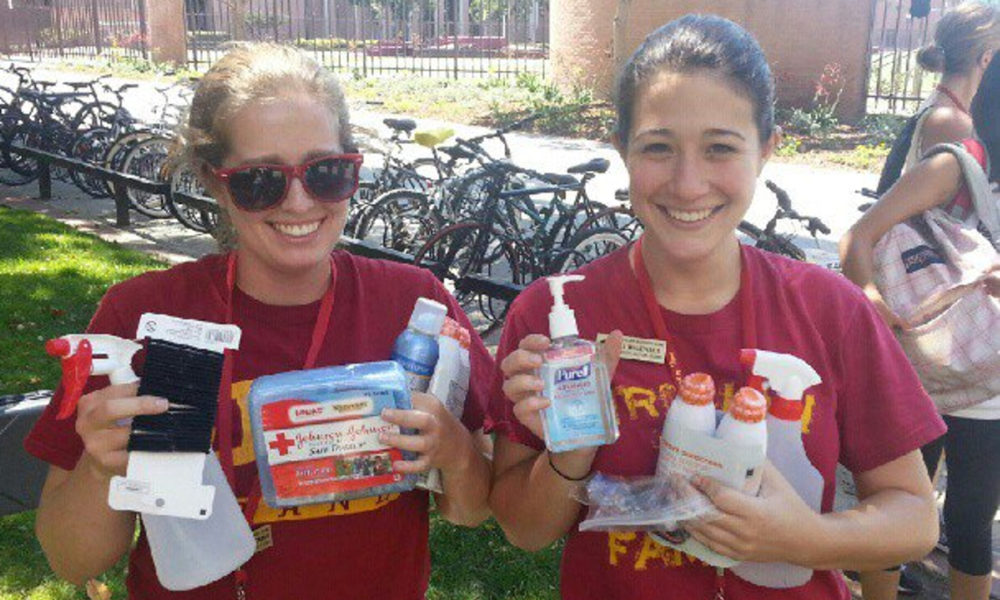Take care of yourselves and your bandmates this season with first aid tips for sunburns, dehydration, sprains and strains, cuts and scratches, and concussions.
As athletic activities, the marching arts have similar hazards of contact sports. Take heed of this advice to prevent illnesses and injuries.
Sunburn
Signs and Symptoms: Skin irritation, blisters, redness, pain
When the aroma of sunscreen fills the air, summer rehearsals will have begun. Prevention is key to avoiding the pain and skin damage caused by sunburn. Be sure to apply sunscreen with a rating of SPF 15 or higher and reapply regularly. While avoiding the sun may not be practical for your rehearsal schedule, try to limit unnecessary exposure.
If blisters form or skin begins to become irritated, do not break the blisters, according to the National Institute for Occupational Safety and Health. Breaking the skin causes an open wound that can be prone to infection. If an open wound is present, cleanse the area, apply antiseptic, and cover it with a sterile bandage.
Dehydration
Signs and Symptoms: Cramps, headache, nausea, dizziness, weakness, fainting, seizures
Dehydration is a contributing factor to heat cramps and more serious heat-related emergencies such as heat exhaustion or heat stroke. Dehydration is attributed to the loss of fluids and electrolytes in the body, according to the American Red Cross. The combination of exposure to warm temperatures and energy exerted while participating in the marching arts increases your likelihood of becoming dehydrated.
To prevent dehydration, hydrate! According to new guidelines released in 2015, the American Red Cross recommends sipping a beverage containing electrolytes and carbohydrates such as a sports drink, coconut water, or milk when the signs or symptoms of dehydration exist. Do not give drinks containing caffeine, which can further dehydrate a person.
If dehydration is left untreated, serious and potentially life-threatening heat-related emergencies can occur. If someone is feeling weak, dizzy, or nauseous due to possible dehydration, prevent fainting by having the person sit down or lie down flat on his or her back. If the person loses consciousness for more than a few seconds, call 9-1- 1 immediately.
Sprains and Strains
Signs and Symptoms: Pain, swelling, limited mobility
Sprains and strains exhibit similar signs, symptoms and treatments. The difference stems from the anatomy. A sprain is caused by a stretch, tear, or other damage involving a ligament while strains involve tendons. Ligaments attach bones to bones while tendons join muscles to bones. The American Red Cross recommends the RICE mnemonic as first aid for sprains and strains.
- Rest: Limit use of the injured body part.
- Immobilize: Stabilize the injured body part with an elastic bandage or a splint to limit motion.
- Cold: Apply a cold pack wrapped in a thin, dry towel to the area for no more than 20 minutes at a time, and wait at least 20 minutes before applying the cold pack again.
- Elevate: Propping up the injured part may help to reduce swelling, but do not do so if raising the injured part causes more pain.
Cuts and Scratches
Signs and Symptoms: Bleeding, broken skin
The potential for open wounds exist in any physical activity, including the marching arts. Use rubber gloves when providing first aid to others to stop the bleeding and protect the wound from infection. Direct pressure with a sterile gauze dressing should be used to stop bleeding. Cleanse the area using warm soapy water. Dry the area and apply an antibiotic if the person is not allergic. Finally, cover the area with sterile gauze and bandage. Be sure to re-dress wounds on a regular basis.
Concussions
Signs and Symptoms: Loss of consciousness, slurred speech, seizures, repeated vomiting, altered mental state
Whether jazz running backwards with a tuba or spinning sabers and rifles, the marching arts present environments prone to collisions. While the utilization of helmets is dubious, it is important to at least recognize the risk of concussions, or mild traumatic brain injuries, while on the field or floor. The Centers for Disease Control and Prevention estimate that 1.6 to 3.8 million concussions occur annually while engaging in sports or recreational activities. This number is grossly understated, however, as many do not seek medical attention.
Recognizing the “red flags,” no pun intended, for concussions is important. According to the National Athletic Trainers’ Association, any loss of consciousness, slurred speech, seizures, or an altered mental state warrant advanced medical attention. In these cases, directors and staff should not hesitate to call 9-1- 1 for an ambulance. For moderate or minor symptoms, assessment by a physician is still advisable.
Moderate symptoms may include headache, balance problems, dizziness, confusion, irritability, and/or weakness or numbness in extremities. Minor symptoms may include sensitivity to light, slowed reaction time, or sleep problems. A trip to the emergency room, urgent care center, or primary care physician should be considered. The most important step to ensuring the continued health and safety of performers is an evaluation by a healthcare provider.
Now is the time to prepare for the upcoming season! Safe marching!
About the Author
Justin M. Eberly is an active emergency medical technician (EMT) in Cumberland County, Pennsylvania. As a public safety educator, he has experience with national delivery of educational and training programs for emergency service organizations and has served as adjunct faculty for emergency services at two technical colleges serving the South Central Pennsylvania region. Previously, he served as the assistant chief of an ambulance service.
Eberly has played the trumpet for 15 years and is a proud alumnus of the Cumberland Valley High School Marching Band in New Kingstown, Pennsylvania, and the Shippensburg (Pennsylvania) University “Red Raider” Marching Band. He currently serves as a member of the marching band staff at Cumberland Valley High School.
Photo by Elizabeth Geli


